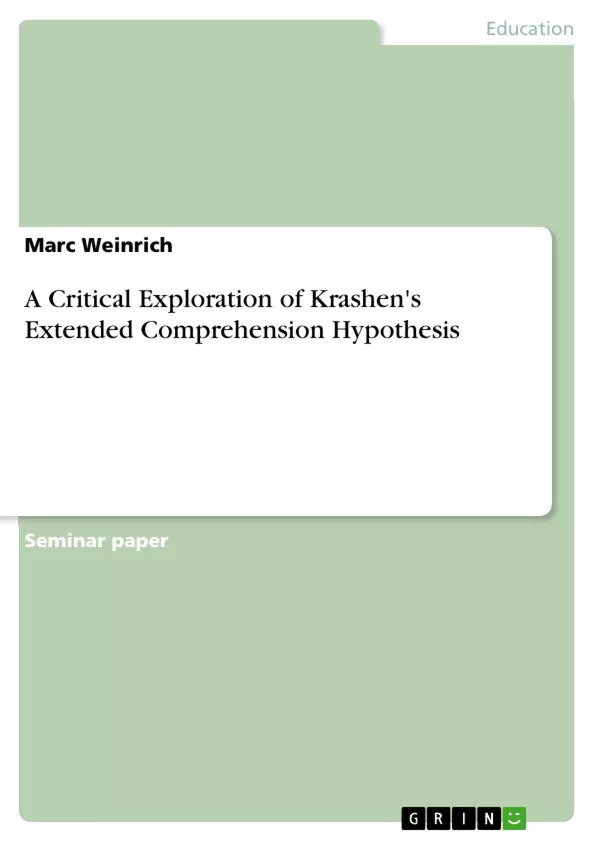Stephen Krashen has been one of the most influential contemporary linguists in the field of second language acquisition (SLA). He became well-known on account of various concepts that he created such as the Acquisition-Learning Hypothesis, the Monitor Hypothesis, the Affective Filter Hypothesis, the Input Hypothesis and the Natural Order Hypothesis. These concepts play an important role in the study of second language acquisition, but they are also seen as somewhat controversial in the field of SLA. At the beginning of 2009, an article was published in which Krashen expands upon his own Input Hypothesis, also known as the Comprehension Hypothesis. A critical look will be taken at Krashen’s statements in which the Comprehension Hypothesis will be explored and opposing theories and approaches will be discussed. There will also be a focus on what can be inferred from the Comprehension Hypothesis and the discussion of this hypothesis. A conclusion will be drawn as to what this means for second language education at school. The goal of this paper is to present the controversy surrounding Krashen’s Comprehension Hypothesis by exploring its weaknesses and providing an alternative and critical perspective.
Table of Contents
- Introduction
- Outline of Krashen's Comprehension Hypothesis
- Critical Exploration of Krashen's Comprehension Hypothesis
- Conclusion
Objectives and Key Themes
The paper aims to present the controversy surrounding Krashen's Comprehension Hypothesis (CH) by exploring its weaknesses and providing an alternative and critical perspective.
- The Comprehension Hypothesis and its implications for second language acquisition (SLA)
- Critical analysis of Krashen's claims and arguments
- Discussion of opposing theories and approaches
- The role of input and output in language learning
- The effectiveness of direct instruction in language acquisition
Chapter Summaries
- Introduction: This chapter introduces Stephen Krashen's Comprehension Hypothesis (CH) and its role in the field of second language acquisition (SLA). It highlights the controversy surrounding Krashen's concepts and outlines the structure of the paper.
- Outline of Krashen's Comprehension Hypothesis: This chapter provides a detailed explanation of Krashen's CH, emphasizing the importance of comprehensible input in language acquisition. It discusses the various affective variables that influence language acquisition, including anxiety, self-esteem, and motivation.
- Critical Exploration of Krashen's Comprehension Hypothesis: This chapter critically examines Krashen's CH, exploring its weaknesses and contrasting it with opposing theories and approaches. It analyzes the role of direct instruction, output, and error correction in language learning, and provides evidence from research studies.
Keywords
The key terms and concepts of the text include Krashen's Comprehension Hypothesis, second language acquisition, comprehensible input, affective filter, input hypothesis, output hypothesis, direct instruction, skill-building hypothesis, and language development.
Frequently Asked Questions
What is Krashen's Comprehension Hypothesis?
Also known as the Input Hypothesis, it states that language acquisition occurs when learners receive "comprehensible input" – messages they understand that are slightly above their current level (i+1).
What is the Affective Filter?
The Affective Filter is a mental block caused by variables like high anxiety, low self-esteem, or lack of motivation, which prevents input from reaching the language acquisition part of the brain.
How does acquisition differ from learning according to Krashen?
Acquisition is a subconscious process similar to how children learn their first language, while learning is a conscious study of grammar rules and formal structures.
What are the main criticisms of the Comprehension Hypothesis?
Critics argue that Krashen downplays the importance of "output" (speaking/writing) and direct instruction, suggesting that input alone may not be sufficient for full grammatical accuracy.
What does this mean for school language education?
It suggests that schools should focus more on providing rich, interesting, and comprehensible reading and listening materials rather than relying solely on repetitive grammar drills.
- Quote paper
- Marc Weinrich (Author), 2009, A Critical Exploration of Krashen's Extended Comprehension Hypothesis, Munich, GRIN Verlag, https://www.grin.com/document/158195



